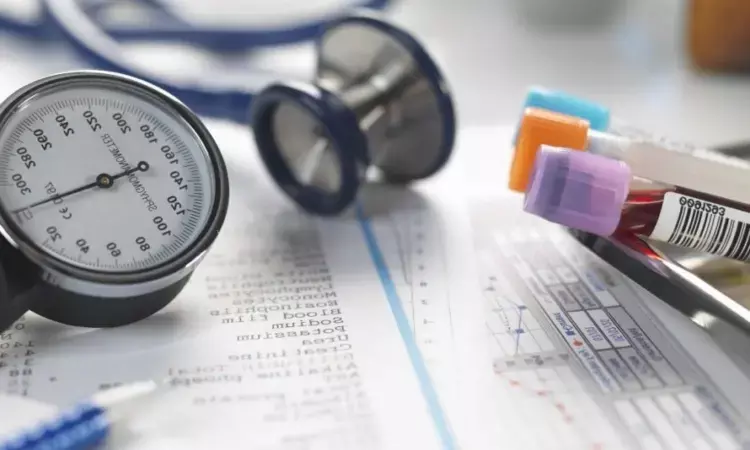- Home
- Medical news & Guidelines
- Anesthesiology
- Cardiology and CTVS
- Critical Care
- Dentistry
- Dermatology
- Diabetes and Endocrinology
- ENT
- Gastroenterology
- Medicine
- Nephrology
- Neurology
- Obstretics-Gynaecology
- Oncology
- Ophthalmology
- Orthopaedics
- Pediatrics-Neonatology
- Psychiatry
- Pulmonology
- Radiology
- Surgery
- Urology
- Laboratory Medicine
- Diet
- Nursing
- Paramedical
- Physiotherapy
- Health news
- Fact Check
- Bone Health Fact Check
- Brain Health Fact Check
- Cancer Related Fact Check
- Child Care Fact Check
- Dental and oral health fact check
- Diabetes and metabolic health fact check
- Diet and Nutrition Fact Check
- Eye and ENT Care Fact Check
- Fitness fact check
- Gut health fact check
- Heart health fact check
- Kidney health fact check
- Medical education fact check
- Men's health fact check
- Respiratory fact check
- Skin and hair care fact check
- Vaccine and Immunization fact check
- Women's health fact check
- AYUSH
- State News
- Andaman and Nicobar Islands
- Andhra Pradesh
- Arunachal Pradesh
- Assam
- Bihar
- Chandigarh
- Chattisgarh
- Dadra and Nagar Haveli
- Daman and Diu
- Delhi
- Goa
- Gujarat
- Haryana
- Himachal Pradesh
- Jammu & Kashmir
- Jharkhand
- Karnataka
- Kerala
- Ladakh
- Lakshadweep
- Madhya Pradesh
- Maharashtra
- Manipur
- Meghalaya
- Mizoram
- Nagaland
- Odisha
- Puducherry
- Punjab
- Rajasthan
- Sikkim
- Tamil Nadu
- Telangana
- Tripura
- Uttar Pradesh
- Uttrakhand
- West Bengal
- Medical Education
- Industry
Higher scores for systemic inflammatory markers linked to higher prevalence of hypertension

In a sweeping epidemiological analysis aimed at unraveling the mysteries of hypertension, researchers have unveiled a significant breakthrough in understanding the associations between systemic inflammation markers and the prevalence of this prevalent health condition. They found a robust and significant positive correlation between systemic immune inflammation index (SII), system inflammation response index (SIRI), and aggregate index of systemic inflammation (AISI) with the prevalence of hypertension, thus underscoring the intricate relationship between systemic inflammation and hypertension.
The study results were published in the journal BMC Cardiovascular Disorders.
Hypertension significantly impacts cardiovascular outcomes, being a major predictor of global mortality and public health concerns. Research suggests links between autoimmunity, inflammation, metabolism, and hypertension. While the systemic immune inflammation index (SII) and hypertension association are explored, the correlations between the system inflammation response index (SIRI) and aggregate index of systemic inflammation (AISI) remain uninvestigated. Hence, researchers conducted a cross-sectional study to comprehensively analyze these inflammation markers, seeking potential biomarkers for early hypertension detection. The present cross-sectional study engaged a substantial cohort of 119,664 individuals participating in the National Health and Nutrition Examination Survey. A meticulous examination of the three systemic inflammation markers—namely, the systemic immune inflammation index (SII), system inflammation response index (SIRI), and aggregate index of systemic inflammation (AISI)—and their associations with hypertension prevalence was carried out.
- The findings unveiled a gradual increase in hypertension prevalence rates with ascending quartiles of logSII, logSIRI, and logAISI.
- In continuous analyses, each unit increase in logSII, logSIRI, and logAISI corresponded to a 20.3%, 20.1%, and 23.7% elevated risk of hypertension, respectively.
- When compared to individuals in the lowest quartiles, those in the highest quartiles of logSII, logSIRI, and logAISI faced hypertension risks elevated by 1.114-fold, 1.143-fold, and 1.186-fold, respectively.
- The Restricted Cubic Splines (RCS) analysis further illuminated a non-linear relationship between the escalation of systemic inflammation markers and the prevalence of hypertension.
- Specifically, a per standard deviation increase in any of these variables correlated with a 9%, 16%, and 11% respective rise in hypertension prevalence.
BDS, MDS
Dr.Niharika Harsha B (BDS,MDS) completed her BDS from Govt Dental College, Hyderabad and MDS from Dr.NTR University of health sciences(Now Kaloji Rao University). She has 4 years of private dental practice and worked for 2 years as Consultant Oral Radiologist at a Dental Imaging Centre in Hyderabad. She worked as Research Assistant and scientific writer in the development of Oral Anti cancer screening device with her seniors. She has a deep intriguing wish in writing highly engaging, captivating and informative medical content for a wider audience. She can be contacted at editorial@medicaldialogues.in.
Dr Kamal Kant Kohli-MBBS, DTCD- a chest specialist with more than 30 years of practice and a flair for writing clinical articles, Dr Kamal Kant Kohli joined Medical Dialogues as a Chief Editor of Medical News. Besides writing articles, as an editor, he proofreads and verifies all the medical content published on Medical Dialogues including those coming from journals, studies,medical conferences,guidelines etc. Email: drkohli@medicaldialogues.in. Contact no. 011-43720751



